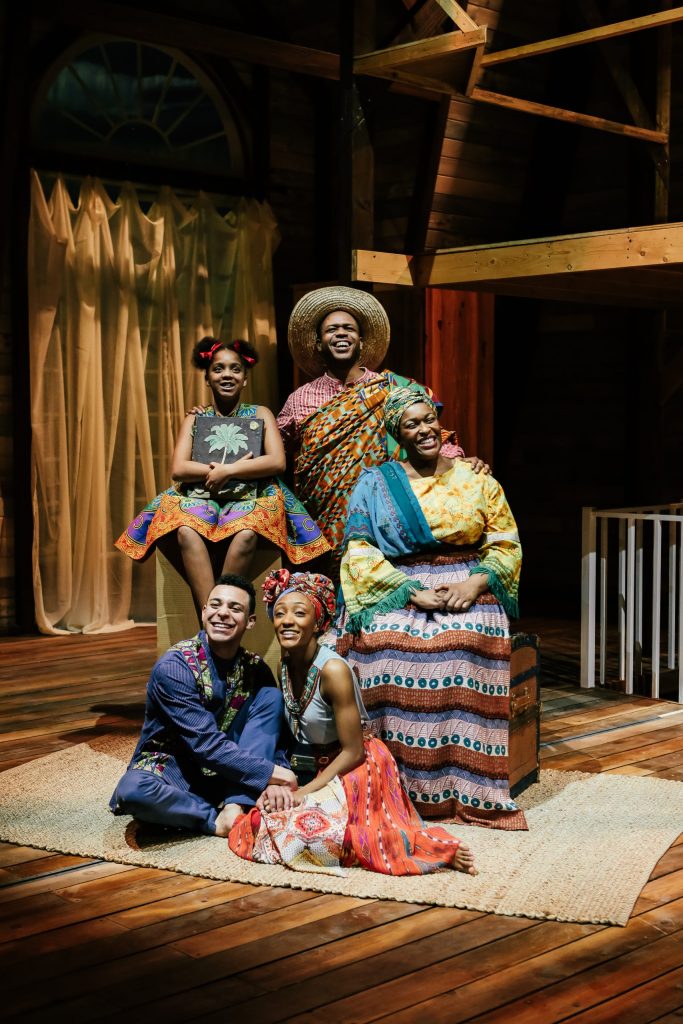Pioneer Theatre’s vibrant “Once on this Island” takes off the winter chill

Entering Simmons Memorial Theatre to see Pioneer Theatre Company’s Once on this Island is like embarking on a vacation to the Caribbean. The stage seems to sway to the rollicking rhythms of Stephen Flaherty’s music as the cast of 11 actors dance their way through a story of attraction and forgiveness.
The musical is based on the novel My Love, My Love, by Trinidadian author Rosa Guy, and its book and lyrics are by Lynn Ahrens. Gerry McIntyre directed this production, and its brightly colored costumes, designed by Yoon Bae, and vibrant storytelling feel like a warm respite on these cold winter nights.
While the narrative emphasizes the conflict between wealthy and peasant classes in the French Antilles, the production presents a multifaceted layering of time and place. It begins with a young actor, Ava Lynn Smith, entering through a trapdoor, wearing a school uniform, and discovering a book that intrigues her. Thunder and lightning indicate a brewing storm and she becomes engrossed in the book as its characters come to life around her. Throughout the performance, actors incorporate storytelling moments in their scenes, reminding us that this is a story we are watching and one that is being recounted.
This layering creates a feeling of spiraling instead of linear or chronological time. That duality is also apparent in the way four god-like characters guide and direct events throughout the musical: they are both present and omnipresent. Performed by Galyana Castillo, Kristian Espiritu, Paul-Jordan Jansen, and Terance Reddick, these deities are charismatic and powerful actors. It was easy to see why they elicit such reverence and awe.
Another sense of layering emerges as natural elements––water, plants, and Mother Earth––are given their own roles, as they too are characters in this tale. The story suggests a world-view that does not assume humans dominate the planet, but rather we co-exist with our environment and natural elements. One of the messages that emerges is the importance of respecting forces of nature, as well as the resources that environments provide and that we must sustain.
These may not be typical themes for musical theatre, but then again Once on this Island is distinct for many reasons: the cast sings and dances throughout the production. Rarely is a line delivered that is not accompanied by music. Dancing is also central to the show: there’s choreography for every scene and the differences in characters’ dance styles play an essential role in a climatic scene when the lovers reveal their “true” identities.
It was wonderful to see the cast convey this kind of embodied communication. As they rolled their shoulders, rippled their torsos, and circled their heads, they suggested cyclical motions similar to the movement of water. They also reinforced the setting of this story on an island surrounded by water. Each of the actors danced through the 90-minute performance beautifully, and their movement added another layer of expression and emotion to the story.
Perhaps the most typical part of Once on this Island is the narrative: a peasant girl rescues and resuscitates a wealthy man after he almost dies in a car accident. She falls in love and wants to be with him, but socio-economic differences interfere.
What makes this production especially compelling is the credibility of the cast. The peasant girl, Ti Moune, is played by Tyla Collier, with a sweetness and naivete that are endearing. She is adopted by her parents, played by Derrick Cobey and Cicily Daniels, who were standouts: riveting performers with gorgeous singing voices who were able to portray their investment in Ti Moune as well as their courage to let her go and follow her dream.
As the wealthy characters, Jordan Alexander, as Daniel Beauxhomme, was appropriately haughty and brash. His fiancée, Andrea, played by Alanna Saunders, a stunningly beautiful actor, was a perfect combination of elegance and arrogance. Marqell Edward Clayton, as Armand, was a regal sophisticate.
In its time and settings, Once on this Island suggests that we can learn a great deal from one another, and that telling our stories may help us to see, honor, and forgive one another more readily. The novelist, Rosa Guy, once said, “I’m a storyteller. I write about people. I want my readers to know people, to laugh with them, to be glad with, to be angry with, to despair with people. And I want them to have hope with people. I want a reader of my work to work a bit more and to care.”
Pioneer Theatre’s Once on this Island is a vibrant and thoughtful production that, in both its themes and its methods, highlights the importance of interconnectedness. Flaherty’s score emphasizes the play of rhythms found in Afro-Caribbean music such as calypso and soca, and the orchestra, conducted by Tom Griffin, supports the cast with their uplifting and infectious percussive beats. The actors’ luxurious voices thread through these rhythms and still reverberate long after the show has ended.
Once on this Island continues through March 7. pioneertheatre.org